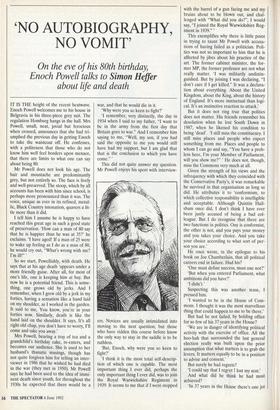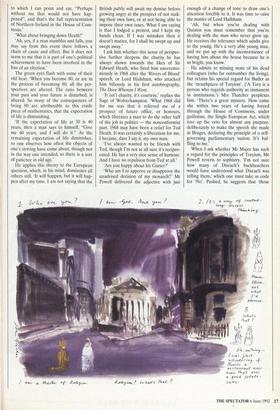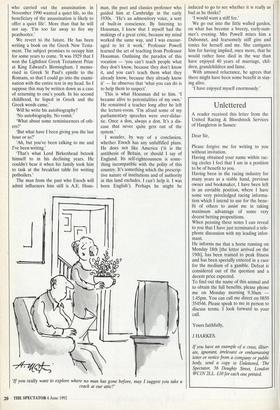NO AUTOBIOGRAPHY, NO VOMIT'
On the eve of his 80th birthday,
Enoch Powell talks to Simon Heifer
about life and death
IT IS THE height of the recent heatwave. Enoch Powell welcomes me to his house in Belgravia in his three-piece grey suit. The regulation Homburg hangs in the hall. Mrs Powell, small, neat, jovial but ferocious when crossed, announces that she had tri- umphed the previous day in getting Enoch to take the waistcoat off. He confesses, with a politeness that those who do not know him well feel borders upon menace, that there are limits to what one can say about being 80.
Mr Powell does not look his age. The hair and moustache are predominantly grey, but not entirely so. The face is lively and well-preserved. The stoop, which by all accounts has been with him since school, is perhaps more pronounced than it was. The voice, unique as ever in its refined, metal- lic, Black Country intonation, quavers a lit- tle more than it did.
I tell him I assume he is happy to have reached this great age in such a good state of preservation. 'How can a man of 80 say that he is happier than he was at 35?' he exclaims. 'I have aged! If a man of 25 were to wake up feeling as I do as a man of 80, he would cry out, "What's wrong with me? I'm ill!" ' So we start, Powellishly, with death. He says that at his age death 'appears under a more friendly guise. After all, for most of one's life, one is keeping him at bay. But now he is a potential friend. This is some- thing, one grows old by jerks. And I remember, when I grew old by a jerk in my forties, having a sensation like a hand laid on my shoulder, as I worked in the garden. It said to me, You know, you're in your forties now. Similarly, death is like the hand laid on the shoulder. It says, It's all right old chap, you don't have to worry, I'll come and take you away.' Mrs Powell, bearing a tray of tea and a grandchild's birthday cake, re-enters, and becomes our audience. She is used to her husband's thanatic musings, though has not quite forgiven him for telling an inter- viewer in 1986 that he wished he had died in the war (they met in 1950). Mr Powell says he had been used to the idea of immi- nent death since youth, for throughout the 1930s he expected that there would be a war, and that he would die in it.
'Why were you so keen to fight?'
'I remember, very distinctly, the day in 1934 when I said to my father, "I want to be in the army from the first day that Britain goes to war." And I remember him saying to me, "Well, my son, if you had said the opposite to me you would still have had my support, but I am glad that that is the conclusion to which you have come." ' This did not quite answer my question. Mr Powell enjoys his sport with interview- ers. Novices are usually intimidated into moving to the next question, but those who have ridden this course before know the only way to stay in the saddle is to be ruthless.
'But, Enoch, why were you so keen to fight?'
'I think it is the most total self-descrip- tion of which one is capable. The most important thing I ever did, perhaps the only important thing I ever did, was to join the Royal Warwickshire Regiment in 1939. It seems to me that if I were stopped
with the barrel of a gun facing me and my brains about to be blown out, and chal- lenged with "What did you do?", I would say, "I joined the Royal Warwickshire Reg- iment in 1939." '
This exemplifies why there is little point in trying to taunt Mr Powell with accusa- tions of having failed as a politician. Poli- tics was not so important to him that he is affected by jibes about his practice of the art. The former cabinet minister, the for- mer MP, the former professor are not what really matter. 'I was militarily undistin- guished. But by joining I was declaring, "I don't care if I get killed." It was a declara- tion about everything. About the United Kingdom, about the King, about the history of England. It's more instinctual than logi- cal. It's an instinctive reaction to attack.'
But it does not ring true that politics does not matter. His friends remember his desolation when he lost South Down in 1987, when he likened his condition to being 'dead'. 'I still miss the constituency. I still miss places and people who expect something from me. Places and people to whom I can go and say, "You have a prob- lem here, I'm your Member of Parliament, will you show me?" ' He does not, though, miss the Commons very much at all.
Given the strength of his views and the infrequency with which they coincided with the Conservative Party's, it was remarkable he survived in that organisation as long as did. He attributes it to 'conformism, to which collective responsibility is intelligible and acceptable. Although Quintin Hail- sham once did, I don't think I have ever been justly accused of being a bad col- league. But I do recognise that there are two functions in politics. One is conformist, the other is not, and you pays your money and you takes your choice. And you take your choice according to what sort of per- son you are.'
He once wrote, in the epilogue to his hook on Joe Chamberlain, that all political careers end in failure. Had his?
'One must define success, must one not?' 'But when you entered Parliament, what ambitions did you have?'
'I didn't.'
Suspecting this was another tease, I pressed him.
'I wanted to be in the House of Com- mons. I thought it was the most marvellous thing that could happen to me to be there.' But had he not failed, by holding office for so few of his 37 years in the House?
'We are in danger of identifying political activity with the exercise of office. All the hoo-hah that surrounded the last general election really was built upon the prior assumption that what matters is to grab the levers. It matters equally to be in a position to advise and consent.'
But surely he had regrets?
'I could say that I regret I lost my seat.' And what did he think he had most achieved?
'In 37 years in the House there's one jot to which I can point and say, "Perhaps without me that would not have hap- pened", and that's the full representation of Northern Ireland in the House of Com- mons.'
`What about bringing down Heath?'
`Ah, yes, if a man stumbles and falls, you may say from this event there follows a chain of cause and effect. But it does not seem to me that it is part of one's political achievement to have been involved in the loss of an election.'
The green eyes flash with some of their old heat. 'When you become 80, or are in the process of becoming 80, all the per- spectives are altered. The ratio between your past and your future is disturbed, is altered. So many of the consequences of being 80 ' are attributable to this crude piece of mathematics, that the expectation of life is diminishing.
`If the expectation of life at 30 is 40 years, then a man says to himself, "Give me 40 years, and I will do it." As the remaining expectation of life diminishes, so one observes how often the objects of one's striving have come about, though not in the way one intended, so there is a sort of patience in old age.'
He applies this theory to the European question, which, in his mind, dominates all others still. 'It will happen, but it will hap- pen after my time. I am not saying that the British public will await my demise before growing angry at the prospect of not mak- ing their own laws, or at not being able to impose their own taxes. What I am saying is that I lodged a protest, and I kept my hands clean. If I was mistaken then it doesn't matter, for I shall be swept up and swept away.'
I ask him whether this sense of perspec- tive further deepens the charity he has always shown towards the likes of Sir Edward Heath, who fired him unceremo- niously in 1968 after the 'Rivers of Blood' speech, or Lord Hailsham, who attacked him biliously in his first autobiography, The Door Wherein I Went.
`It isn't charity, it's courtesy,' replies the Sage of Wolverhampton. 'What 1968 did for me was that it relieved me of a prospect of future office, or honours, which liberates a man to do the other half of the job in politics — the nonconformist part. 1968 may have been a relief for Ted Heath. It was certainly a liberation for me. I became, dare I say it, my own man.
`I've always wanted to be friends with Ted, though I'm not at all sure it's recipro- cated. He has a very nice sense of humour. And I have no repulsion from Ted at all.'
`Are you happy about his Garter?'
`Who am I to approve or disapprove the unadvised decision of my monarch?' Mr Powell delivered the adjective with just enough of a change of tone to draw one's attention forcibly to it. It was time to raise the matter of Lord Hailsham.
`Ah, but when you're dealing with Quintin you must remember that you're dealing with the man who never grew up. He receives the tolerance which adults give to the young. He's a very able young man, and we put up with the inconvenience of having him about the house because he is so bright, you know.'
He admits to missing none of his dead colleagues (who far outnumber the living), but retains his special regard for Butler as the 'mouthpiece of Toryism'. CA Tory is a person who regards authority as immanent in institutions.') Mrs Thatcher perplexes him. 'There's a great mystery. How came she within two years of having forced through the House of Commons, under guillotine, the Single European Act, which tore up the veto for almost any purpose, deliberately to make the speech she made at Bruges, declaring the principle of a self- governing parliamentary nation. It's baf- fling to me.'
When I ask whether Mr Major has such a regard for the principles of Toryism, Mr Powell reverts to sophistry. 'I'm not sure how many of Disraeli's backbenchers would have understood what Disraeli was telling them,' which one must take as code for 'No'. Pushed, he suggests that 'those who carried out the assassination in November 1990 wanted a quiet life, so the beneficiary of the assassination is likely to offer a quiet life'. More than that he will not say. 'I'm too far away to fire my peashooter.'
We revert to the future. He has been writing a book on the Greek New Testa- ment. The subject promises to occupy him for some years to come. 'It was 1929 that I won the Lightfoot Greek Testament Prize at King Edward's Birmingham. I memo- rised in Greek St Paul's epistle to the Romans, so that I could go into the exami- nation with the entire text in my head. So I suppose this may be written down as a case of returning to one's youth. In his second childhood, he lisped in Greek and the Greek words came.'
Will he write his autobiography?
`No autobiography. No vomit.'
`What about some reminiscences of oth- ers?'
`But what have I been giving you the last hour or so?'
`Ah, but you've been talking to me and I've been writing.'
`That's what Lord Birkenhead betook himself to in his declining years. He couldn't bear it when his family took him to task at the breakfast table for writing potboilers.'
The man from the past who Enoch will admit influences him still is A.E. Hous- man, the poet and classics professor who guided him at Cambridge in the early 1930s. 'He's an admonitory voice, a sort of built-in conscience. By listening to Housman, I knew that I myself had the makings of a great critic, because my mind worked the same way, and I was encour- aged to let it work.' Professor Powell learned the art of teaching from Professor Housman. Outlining the paradox of this vocation — 'you can't teach people what they don't know, because they don't know it, and you can't teach them what they already know, because they already know it' — he observes that 'what you can do is to help them to suspect'.
This is what Housman did to him. 'I became alive to potentialities of my own.' He remained a teacher long after he left the lecture-room. 'I'm afraid some of my parliamentary speeches were over-didac- tic. Once a don, always a don. It's a dis- ease that never quite gets out of the system.'
I wonder, by way of a conclusion, whether Enoch has any unfulfilled plans. He does not like America (It is the antithesis of Britain, or should I say of England. Its self-righteousness is some- thing incompatible with the polity of this country. It's something which the prescrip- tive nature of institutions and of authority in this land excludes. I can't help it. I was born English'). Perhaps he might be 'If you really want to explore where no man has gone before, may I suggest you take a crack at our attic?' induced to go to see whether it is really as bad as he thinks?
`I would want a stiff fee.'
We go out into the little walled garden, on what has become a breezy, early-sum- mer's evening. Mrs Powell mixes him a Dubonnet, and fearsomely stiff gins and tonics for herself and me. She castigates him for having implied, once more, that he would rather have died in the war than have enjoyed 40 years of marriage, chil- dren, grandchildren and fame.
With amused reluctance, he agrees that there might have been some benefit in stay- ing alive.
'I have enjoyed myself enormously.'




































































 Previous page
Previous page